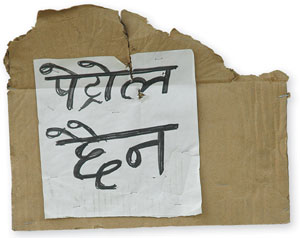|
|
The long queues at gas stations in the capital this week mean only one thing: this country is bankrupt.
The latest crisis has been sparked off by Nepal Oil Corporation (NOC) not having the money to pay for this month's import of oil from India. It has stocks to last just two more days.
Thursday's eight-party meeting is being held to decide on a date for the postponed constituent assembly elections. But the politicians should first figure out a way to pay India to resume imports.
"We've always sold low and bought high, and that's no way to run a business," says NOC spokesman Ichchha B Thapa, "either the government allows us to raise fuel prices or it pays Indian Oil. There is no other solution to this."
Street protests last August forced the government to backtrack on a price hike. Ever since, NOC has amassed nearly Rs 6 billion in debt. Now, Indian Oil has refused to ship more oil unless it receives Rs 150 million a month. Indian Oil has been cutting back on supplies by 30 percent in past months to prod the NOC to clear its dues.
The Petroleum Dealers' Association says private pumps have not got supplies since Tuesday. "We'll keep having these shortages until the government pays the Indians," says Sharad Bhandari of the dealers' association. "And for that, the eight parties need to take a quick decision." There are long queues at government gas stations, and private pumps have run out of fuel.
NOC's losses total Rs 250 million a month and there is rampant smuggling of petrol back into India because of a Rs 7 per litre price differential. In the short-term there doesn't seem to be any alternative but to raise gas prices, but this is a hot potato no politician wants to touch.
In the long term, given Nepal's heavy dependence on imported oil and air pollution problems, there must be a move towards electric vehicles, says JA Goff at the renewable energy group Eco-Visions in Kathmandu. "It would be prudent for the government of Nepal to eliminate all import duties and taxes on electric vehicles like it did with Safa tempos," he says.
For example, Japan has no tax on electric cars and instead offers a $2,500 rebate per electric car, which the country fully recoups in saved fuel bills and pollution reduction.



